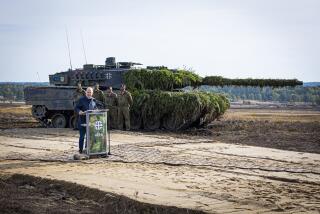Avoid a ‘Black Hole,’ Plan Now for the Post-Sanctions Era
- Share via
This week the United Nations Security Council voted to extend economic sanctions on Iraq for once again failing to comply fully with U.N. resolutions to eliminate Iraqi chemical and biological weapons. But council members are sharply divided on sanctions, and the political will to maintain the pressure is waning. It seems only a matter of time before the embargo is lifted, even if Baghdad continues its stonewalling tactics.
What will happen then? How can the international community curtail the future reconstitution of Iraq’s weapons of mass destruction? Despite the agreement reached in February between U.N. Secretary-General Kofi Annan and Iraqi President Saddam Hussein over the inspection of “presidential sites,” little progress has been made toward providing clear answers to questions about Iraq’s proscribed weapons programs.
The U.N. Special Commission still lacks a full accounting of Iraq’s chemical weapons program, notably its production of the supertoxic chemical nerve agent VX and its procurement of dual-use production equipment. UNSCOM is even less satisfied with the accuracy of Iraq’s declarations on the scale and scope of its biological weapons program. Indeed, chief U.N. weapons inspector Richard Butler has called the Iraqi biological program “a black hole.”
Serious unanswered questions also remain about Iraq’s indigenous production of ballistic missiles and nonconventional warheads. Even as the U.N. Security Council continues to pressure Baghdad to come clean and to comply with its disarmament obligations, the council should begin planning how best to contain Iraq’s weapons programs after sanctions are lifted.
In addition to destroying munitions stockpiles and dedicated production facilities, U.N. Security Council resolutions call for monitoring the country’s “dual-use” chemical, biological and missile plants in perpetuity to ensure that they are not diverted from legitimate activities to illicit production. The technical means for such long-term monitoring, including video surveillance cameras and resident U.N. inspection teams, are already in place. Even so, it is doubtful that effective monitoring of dual-use facilities will be politically sustainable for a protracted period once sanctions have been lifted. The Iraqis already are suggesting that a post-sanctions inspection regime should consist of much less intrusive monitoring of sensitive sites rather than the “anywhere, anytime” inspection procedures currently in effect.
After sanctions are lifted, it is likely that the resident weapons inspection teams will face growing constraints on their actions and eventually will be required to leave Iraq. If that happens, other international monitoring mechanisms should take their place. In particular, any agreement between the United Nations and Iraq certifying Baghdad’s compliance with U.N. resolutions and lifting sanctions should require Iraq to:
* Accede to the 1993 Chemical Weapons Convention, a global treaty that provides for on-site inspections of weapon sites and commercial chemical plants. The convention’s verification regime is sufficiently intrusive to ensure that militarily significant amounts of chemical warfare agents are not being produced and that all weapon stockpiles have been accounted for and destroyed.
* Accept the strengthened nuclear safeguards regime developed recently by the International Atomic Energy Agency to supplement existing safeguards under the Nuclear Nonproliferation Treaty, to which Iraq is a party. The enhanced inspection procedures mandate access to both declared and undeclared nuclear sites. These safeguards would facilitate the detection of undeclared weapon-related sites and activities, should Iraq relaunch an ostensibly peaceful nuclear program.
* Sign and ratify the compliance protocol that is being negotiated to strengthen the 1972 Biological Weapons Convention, which Baghdad was forced to ratify as a condition of the 1991 Gulf War cease-fire. Washington should strive to accelerate the protocol negotiations, which have languished because of a lack of U.S. leadership.
Although the verification regimes for the multilateral treaties mentioned above are nowhere near as intrusive as the current inspection system in Iraq, they offer a first line of defense for containing the spread of nuclear, biological and chemical weapons. Unfortunately, the United States and other Western countries have not provided adequate financial support for these regimes. Whereas the annual safeguards budget of the IAEA is only about $80 million, deploying U.S. military forces to the Persian Gulf to enforce the U.N. weapons inspections in Iraq already has cost 10 times that amount.
Given the growing pressure to lift sanctions, it is clear that the current U.N. inspection regime in Iraq will not go on forever. If multilateral nonproliferation treaties are adequately funded, monitored and enforced, however, they offer a fallback means of containing the threat posed by Iraq’s proscribed weapons programs even after the U.N. inspectors leave Baghdad.
More to Read
Sign up for Essential California
The most important California stories and recommendations in your inbox every morning.
You may occasionally receive promotional content from the Los Angeles Times.













